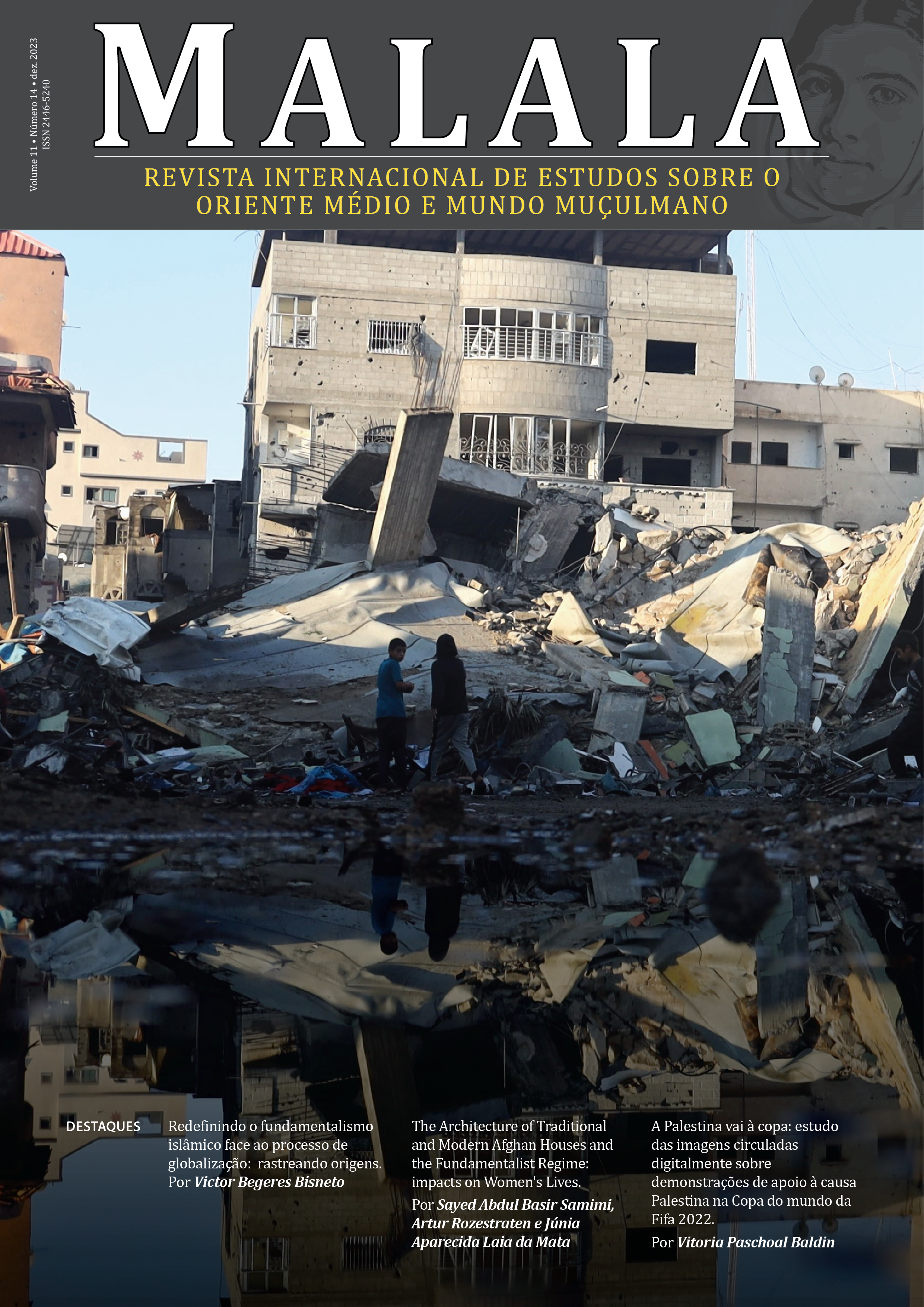Redefining Islamic fundamentalism in the face of the globalization process: tracking origins
DOI:
https://doi.org/10.11606/issn.2446-5240.malala.2023.213829Keywords:
Islamic fundamentalism, Jihadism, Political IslamAbstract
In recent decades, the term “fundamentalismo” has become popular through various communication vehicles, using it to classify groups and organizations, mainly Islamic, involved in illicit actions, terrorist attacks and ultraconservative bias, which in a way use religion for their actions. This article seeks to review, clarify and understand the origins and strands of fundamentalism, especially when linked to Islam, which makes the task of “fining out” the concept of this syntagm complex, which is often confused with other denominations, such as political Islam, jihadism, salafism among others. Therefore, we propose a discussion about their meanings, a periodization of their uses and contexts and, finally, we suggest a kind of genealogy of these multiple terms from the analysis of the conceptions of several authors on the subject.
Downloads
References
AHMED, Akbar. Journey into Islam: The Crisis of Globalization. Washington, DC: Brookings, 2007.
ALI, Ayaan Hirsi. Herege: por que o islã precisa de uma reforma imediata? São Paulo: Companhia das Letras, 2015.
ALIGHIERI, Dante. A divina comédia. São Paulo: Nova Cultural, 2002 [1321].
ARMSTRONG, Karen. Em nome de Deus: o fundamentalismo no judaísmo, no cristianismo e no islamismo. São Paulo: Companhia das Letras, 2009.
ASSAYED, Ayatullah Al-Odhma; FADLULLAH, Mohammad Hussein. O aspecto moral da força do Islam. São Paulo: Edições Arresala, 2005. v. 3.
ATWAN, Abdel Bari. A história secreta da Al-Qaeda. São Paulo: Larousse, 2008.
AYUBI, Nazih. Political Islam: Religion and Politics in the Arab World. London: Routledge, 1991.
BÍBLIA sagrada. São Paulo: Editora Vida, 1984.
BEGERES BISNETO, Victor. Fronts Islamistas no Brasil: prenúncios de uma radicalização incompleta face ao fundamentalismo existencial. Tese de Doutorado em História, Universidade de São Paulo, Faculdade de Filosofia, Letras e Ciências Humanas, 2019. Acesso em 11 de dezembro de 2023. Disponível em https://www.teses.usp.br/teses/disponiveis/8/8138/tde-12122019-170616/fr.php
BURUMA, Ian; MARGALIT, Avishai. Ocidentalismo: o Ocidente aos olhos de seus inimigos. Rio de Janeiro: Zahar, 2006.
CALVERT, John. Sayyid Qutb and the Origins of Radical Islamism. New York: Oxford University Press, 2013.
COCKBURN, Patrick. A origem do estado islâmico: o fracasso da guerra ao terror e a ascensão jihadista. São Paulo: Autonomia Literária, 2015.
DEMANT, Peter Robert. “How to Criticize Islam?: ‘Innocence of Muslims’ and the War of Representations in the Mirror of the Clash between Radical Islam and Islamophobia”. Malala, v. 3, n. 5, 2015. DOI: 10.11606/issn.2446-5240.malala.2015.107838.
DEMANT, Peter Robert. O mundo muçulmano. São Paulo: Contexto, 2008.
DICKENS, Charles. Hard Times. London: Pinguin English Library, 2012 [1854].
EISENSTADT, Shmuel Noah. Fundamentalism, Sectarianism, and Revolution: The Jacobin Dimension of Modernity. Cambridge: Cambridge University Press, 1999.
EISENSTADT, Shmuel Noah. Fundamentalismo e modernidade: heteroxias, utopismo e jacobinismo na constituição de movimentos fundamentalistas. Oeiras: Celta, 1997.
ESPOSITO, John L. Unholy War: Terror in the Name of Islam. London: Oxford University Press, 2002.
FERREIRA, Francirosy Campos Barbosa. “Jihadistas são todos muçulmanos”. Instituto da Cultura Árabe, 28 fev. 2016. Disponível em: https://bit.ly/2VjqwF8. Acesso em: 15 jun. 2023.
GRANGER, Gilles Gaston. A ciência e as ciências. São Paulo: Editora Unesp, 2004.
HUNTINGTON, Samuel. O choque de civilizações e a recomposição da ordem mundial. Rio de Janeiro: Biblioteca do Exército Editora, 1998.
JACKSON, Roy. Fifty Key Figures in Islam. New York: Routledge, 2006.
KEPEL, Gilles. Jihad. Paris: Gallimard, 2003.
LEWIS, Bernard. A crise do Islã: guerra santa e terror profano. Rio de Janeiro: Zahar, 2004a.
LEWIS, Bernard. From Babel to Dragomans: Interpreting the Middle East. New York: Oxford University Press, 2004b.
LEWIS, Bernard. O que deu de errado no Oriente Médio. Rio de Janeiro: Zahar, 2002.
MARTON, Fabio. “Muhammad Ahmed”. Aventuras na História, n. 153, p. 29-39, abr. 2016.
RAFFESTIN, Claude. Por uma geografia do poder. São Paulo: Ática, 1993.
RASHID, Ahmed. Jihad. São Paulo: Cosac Naify, 2003.
ROTTERDAM. Erasmo de. Elogio da loucura. São Paulo: Sapienza, 2005.
ROY, Olivier. “L’Échec de l’islam politique”. Politique étrangere, v. 54, n. 4, p. 954-955, 1992.
ROY, Olivier. The Failure of Political Islam. Cambridge, MA: Harvad University Press, 1994.
ROY, Olivier. L'islam mondialisé. Paris: Édition du Seuil. 2004
ROY, Olivier. La Sainte ignorance: le temps de la religion sans culture. Paris: Seuil, 2008.
RUTHVEN, Malise. Fundamentalism: The Search for Meaning. New York: Oxford University Press, 2005.
SAID, Edward. L’Orientalisme: l’Orient créé par l’Occident. Paris: Seuil, 2005.
SIVAN, Emmanuel. Radical Islam, Medieval Theology and Modern Politics. New Haven, CT: Yale University Press, 1985.
Fundamentalism in the Sunni Arab World: Egypt and the Sudan”. In: MARTY, Martin E.; APPLEBY, R. Scott (ed.). Fundamentalisms Observed. Chicago: The University of Chicago Press, 1991. p. 345-403.
WARRAQ, Ibn. Why I Am Not Muslim. New York: Prometheus, 1995.
Downloads
Published
Issue
Section
License
Copyright (c) 2023 Victor Begeres Bisneto

This work is licensed under a Creative Commons Attribution-NonCommercial-ShareAlike 4.0 International License.
This journal offers free access to its content, following the principle that making free of charge-scientific knowledge available to the public provides greater worldwide democratization of knowledge. No fees will be charged for submitting work and/or publishing in the journal, as well as for reading, downloading, copying, distributing, printing, searching or referencing after publication. Readers and interested parties are free to share (copy or distribute the material in any media and format) and to transform or adapt parts of the material as long as it is for non-commercial use and the appropriate credit is given to the author and the journal, indicating how the data has been used and/or manipulated.





